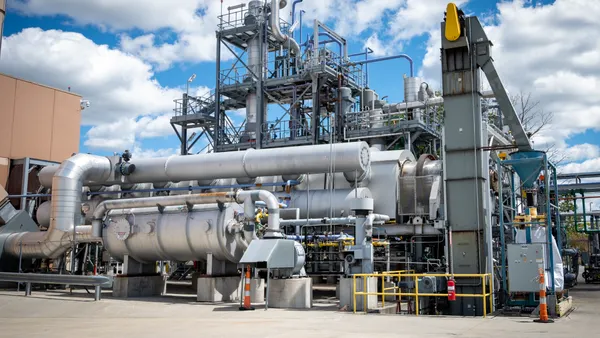UPDATE: April 6, 2020: Gov. Jay Inslee has vetoed a bill setting post-consumer recycled content standards (HB 2722). Heather Trim, executive director for Zero Waste Washington, told Waste Dive the bill posed cost concerns, prompting the veto at a time when Washington is reeling from the new coronavirus. Trim said activists would help bring the bill back next session.
But Inslee did approve another bill banning single-use plastic bags (SB 5323), making Washington the ninth state with some form of bag policy. The move came even as some states are re-thinking their bag restrictions due to the new coronavirus, including New Hampshire, which is requiring single-use paper and plastic bags right now for shopping. Washington's ban goes into effect on Jan. 1, 2021.
Dive Brief:
- Washington state is considering establishing minimum post-consumer recycled content (PCR) standards for plastic beverage containers (HB 2722), banning single-use plastic bags that do not meet minimum content standards (SB 5323), and banning expanded polystyrene products (SB 6213).
- The first bill has passed the state House and the latter two have passed the state Senate, with further committee hearings scheduled this week. But it is unclear how each might ultimately fare. A prior version of the bag ban, for example, passed the Senate last year before stalling in the House.
- Groups like Zero Waste Washington are supportive of these bills and other waste-centric legislation. Heather Trim, the organization's executive director, told Waste Dive the uptick reflects a growing national trend. "I think there's going to be a lot of plastics-related legislation across the United States because there's so much public interest," she said.
Dive Insight:
Regulations targeting plastics are becoming relatively commonplace, as cities and states like Washington seek to crack down on forms of pollution and ramp up their climate and environmental goals.
SB 5323, the bag-focused bill, headed to the House in mid-January. That legislation would ban retailers from using the bags in addition to levying an 8-cent fee on other non-plastic single-use bags. It would also require paper bags be made from 40% recycled material.
The American Recyclable Plastic Bag Alliance, which has historically opposed similar legislation, did not respond to requests for comment on the bill. The American Forest and Paper Association has testified in opposition. A number of local grocers, however, have expressed support, as has service provider Recology.
Thirty-seven Washington jurisdictions already have plastic bag regulations in place, and Gov. Jay Inslee has been supportive, but the bill's failure to pass at the state level last year could spell trouble. Opposition from the pulp and paper industry posed an obstacle during the 2019 session, although proponents feel they have a better chance this year.
Other bills have amassed their own support, including the PCR legislation that would require beverage manufacturers to report the type and amount of virgin and PCR plastics they use. HB 2722 would also require PCR content minimums beginning at 10% in 2022, and increasing to 50% by and after 2030. While some waivers might be allowed, increasing fees for violations would be imposed. The International Bottled Water Association and Wine Institute have testified in opposition.
When reached for comment, Washington Waste and Recycling Association Executive Director Brad Lovaas directed Waste Dive to a January letter expressing support.
"Real recycling requires that recyclable materials replace virgin feedstocks in manufacturing," Lovaas wrote to the bill's sponsor, state Rep. Jared Mead, going on to note ongoing commodity market fluctuations. "More so than any policy, developing strong markets for Washington's recyclables will ensure the long-term environmental and economic sustainability of Washington's excellent recycling system."
The third bill, SB 6213, targets expanded polystyrene bill and has a sister bill in the House, HB 2429, which is stricter in its scope. The Senate bill passed Feb. 17, while the House bill is still in committee. Under the passed bill, covered expanded polystyrene products would be banned as of June 2023, preempting local ordinances not enacted before June 2020. Covered containers for eggs, uncooked meat and other products would be exempt. Manufacturers in violation of the law could face fines up to $250 per day, not to exceed $1,000.
Testimony on the original bill indicated a range of viewpoints on the ban. While environmental groups have been supportive, opponents argued a ban would harm jobs and make it difficult for businesses to find replacements.
Washington is also weighing other bills relating to issues spanning from compost use to industrial waste, making the legislative session a notable one for the sector. Depending on the outcome, the state could join others in potentially passing major waste legislation this year.
Following a string of activity in 2019, single-use bag policies are now effective or pending across eight states and many local municipalities, with many more proposed. Expanded polystyrene bans are newer at the state level, with only two passed, but other states are eyeing policies of their own. No state has passed PCR requirements for plastic containers yet, following a veto in California last year, but Maine has a bill with some level of industry backing that could see new momentum.









